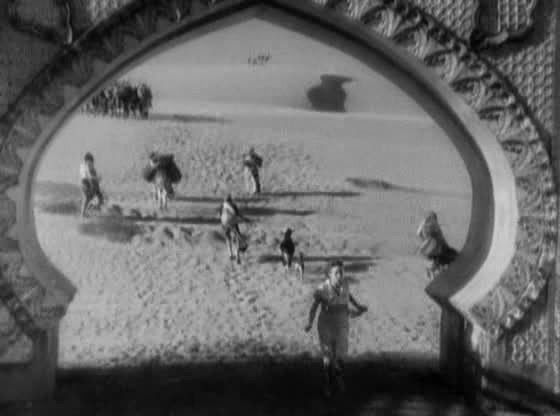A legionnaire falls in love with a nightclub singer.
Possibly best known for it's ending, the film has a strange pacing - I haven't seen that many Sternberg films yet, but I do remember that he seems way more interested in the inner life of the characters than in the display of any kind of action. The story is there alright, but Sternberg's transformation to the screen makes it strangely static - an effect I noticed even more in "Shanghai Gesture".
Possibly best known for it's ending, the film has a strange pacing - I haven't seen that many Sternberg films yet, but I do remember that he seems way more interested in the inner life of the characters than in the display of any kind of action. The story is there alright, but Sternberg's transformation to the screen makes it strangely static - an effect I noticed even more in "Shanghai Gesture".
|
1.1
|
Legion arrives in the city. The legionnaire (Cooper) checks out
the women. He is scolded by his sergeant for that. |
|
|
|
1.2
|
00:06
|
A nightclub singer (Dietrich) and a rich gentleman (Menjou)
arrive on the boat. She ignores his advances.
|
|
|
1.3
|
00:09
|
A large nightclub. The gentleman is introduced as important.
People gossip. Cooper arrives in the nightclub. |
|
|
1.4
|
00:12
|
Dietrich in her dressing room, getting ready. Fights with the
club owner. |
|
|
1.5
|
00:16
|
Dietrich goes on stage and sings. She notices Cooper and throws
him a rose. |
|
|
1.6
|
00:20
|
Another appearance at the night club. Another song. She has a
talk with Menjou. She understands he is important |
|
|
2.1
|
00:25
|
She sells Cooper an apple. Some bantering. She gives him the key to the apartment. |
|
|
2.2
|
00:26
|
Cooper goes to Dietrich's apartment. He has to shake off
another female suitor (a married woman). |
|
|
2.3
|
00:28
|
Dietrich and Cooper in her apartment. They drink, talk and kiss
a bit. But ultimately, she throws him out/ he leaves. |
|
|
2.4
|
00:35
|
Cooper is stopped by the married woman. But Dietrich has
followed him to take him back. The married woman is spied upon by
her husband. |
|
|
2.5
|
00:38
|
Cooper beats up hudlums that have been hired to teach him a
lesson. |
|
|
2.6
|
00:40
|
Cooper is summoned to his officer. There is a sort of
“showdown”, as the officer interrogating is the husband of the
woman he had an affair with.
|
|
|
2.7
|
00:43
|
Menjou grabs the opportunity and “takes on” Dietrich. |
|
|
2.8
|
00:45
|
Cooper is freed, and ready to go on a mission.
|
|
|
2.9
|
00:46
|
Back in the nightclub, Menjou courts Dietrich in her wardrobe
with jewellery. |
|
|
2.10
|
00:49
|
Cooper waits outside her wardrobe, listens in on the talk and
finally busts in. Menjou leaves immediately. |
|
|
2.11
|
00:51
|
Dietrich asks him to wait for her while she performs. Cooper
realizes that he looks ridiculous with a top hat. He leaves. |
|
|
2.12
|
00:54
|
Wild farewell feast for the soldiers leaving. Cooper kisses
galores of woman goodbye. Dietrich and Menjou are there, she
watches the soldiers leave. She sees the women following. |
|
|
2.13
|
00:59
|
The legionnaires travel through the country and rest somewhere
in middle of nowhere.
|
|
|
2.14
|
1:01
|
Menjou and Dietrich in the dressing room. She hasn't wiped
Coopers message from the mirror. She finally goes with Menjou. |
|
|
2.15
|
1:05
|
The soldiers run into an ambush. They are looking for
volunteers to run through the line of fire. The cheated husband an
Cooper go off. The husband is shot. |
|
|
2.16
|
1:09
|
Dietrich now lives in Menjou's palace. She seems fond of him. |
|
|
2.17
|
1:11
|
A festive dinner party. Dietrich hears the soldiers returning
into town. She runs out to search for Cooper. Who's not there. |
|
|
2.18
|
1:15
|
The other guests at the party are indignant of her behavior.
Dietrich is torn inside. She talks Menjou into going with her to
search for Cooper in another city. |
|
|
3.1
|
1:18
|
In that other town, they search for Cooper. But he's not in the
field hospital. |
|
|
3.2
|
1:20
|
In a seedy bar, Cooper still thinks about Dietrich. When she
finds him, he plays it cool. He is called back to the barracks.
Dietrich finds that he has carved her name into the table. |
|
|
3.3
|
1:26
|
Cooper says goodbye to her and the Menjou. The soldiers line up
and march into the desert. Dietrich runs to the gate and sees the
women following the soldiers. She takes off her shoes and runs
after them, behind the troupe. |
|














Kommentare